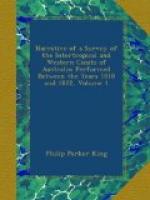(Footnote. It afforded me very great pleasure to hear the high terms in which my late friend and predecessor Captain Flinders was spoken of by the inhabitants of this island, and their general regret at his infamous detention. His friend M. Pitot had lately died, but I met many French gentlemen who were acquainted with him. General Decaen, the governor, was so much disliked by the inhabitants that Captain Flinders gained many friends at his expense who would not otherwise have troubled themselves about him; and this circumstance probably went far towards increasing the severity of the treatment he so unjustly received. An anecdote of him was related to me by a resident of Port Louis, which, as it redounds to his honour, I cannot lose the gratification of recording.
When Captain Flinders was at the house of Madame d’Arifat in the district of Plains Wilhelms, in which he was latterly permitted to reside upon his parole, an opportunity of escaping from the island was offered to him by the commander of a ship bound to India: it was urged to him by his friends that, from the tyrannical treatment he had received and the unjustifiable detention he was enduring, no parole to such a man as General Decaen ought to be thought binding or prevent him from regaining his liberty and embracing any opportunity of returning to his friends and country. The escape was well planned, and no chance of discovery likely to happen: the ship sailed from Port Louis, and at night, bringing to on the leeward side of the island abreast of Captain Flinders’ residence, sent a boat to the appointed spot which was six miles only from Madame d’Arifat’s house; but after waiting until near daylight without the captain making his appearance the boat returned to the vessel, which was obliged to pursue her voyage to prevent suspicion.
It is almost needless to add that Captain Flinders did not think it consistent with his feelings to take advantage of the opportunity, nor to effect his escape from imprisonment by a conduct so disgraceful to the character of a British officer and to the honourable profession to which he belonged.)
For some years past coffee has entirely failed upon the island and cotton is seldom seen growing. The principal attention of the habitans appeared to be given to the cultivation of the sugar cane and maize, both of which had begun to produce an abundant return to the planters; the manihot is also generally cultivated: but the dreadful effects of the hurricanes to which this island is exposed render property of so precarious and doubtful a tenure that nothing is secure until the season for these destructive visitations is over; they last from the beginning of December to the end of April and generally occur about the full of the moon, being invariably preceded by an unsteady motion of the mercury in the barometer. They are not always so violent as to be termed hurricanes: the last experienced before our visit was merely a coup de vent, by which very little damage was sustained.*




